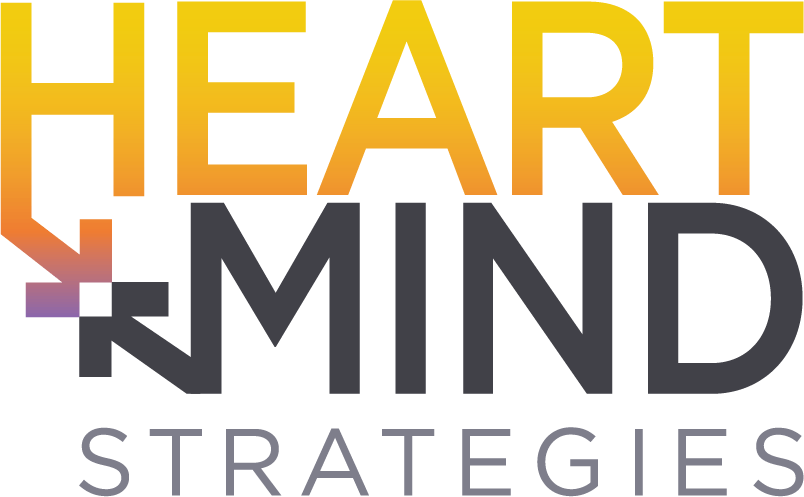What if the real crisis in America isn’t political polarization—but the loss of our ability to talk to each other?
That’s the question at the heart of Heart+Mind Strategies’ special edition roundtable, From Conflict to Connection: Uniting on Common Ground. The session was hosted by Heart+Mind’s CEO Dee Allsop and moderated by Heart+Mind’s VP of Public Policy Erin Norman. It wasn’t just another panel discussion. It was a masterclass in how to rebuild civil discourse from the ground up, featuring three leaders who’ve made it their life’s work to help people reconnect across divides:
- Maury Giles, CEO of Braver Angels
- Carrie Conko, CEO of Iron Light and producer of the documentary Undivide Us
- Ben Klutsey, Executive Director at the Mercatus Center and founder of the Pluralist Lab
Maury Giles: Courageous Citizenship Starts Local
Braver Angels was founded in the wake of the 2016 election to bring liberals and conservatives together for civil dialogue. But CEO Maury Giles is pushing the organization into a new chapter, one that goes beyond talking and into doing. He calls it “courageous citizenship.”
Braver Angels now supports 125 bipartisan alliances across the country, hosting workshops, debates, and town halls. Giles emphasized that hyperpolarization isn’t just a political issue—it’s costing the U.S. economy $2.87 billion every day in workplace conflict. “We’re helping people see each other as more than political labels,” he said.
Carrie Conko: Storytelling as a Bridge
Carrie Conko, CEO of Iron Light and producer of the documentary “Undivide Us,” knows the power of story. Her film was born from a question: Can Americans still talk about tough issues—like immigration, gun rights, and policing—without tearing each other apart?
The answer, surprisingly, was yes.
Conko credits Heart+Mind’s Triadic Illumination method, which helps people articulate not just what they believe, but why someone else might believe differently. “Time and time again, we saw people with opposing views engage in healing conversations,” she said. The film doesn’t just highlight the problem—it showcases the solution.
WATCH: Triadic Illumination Explained
Ben Klutsey: Pluralism Is the New Patriotism
Growing up under military rule in Ghana, Ben Klutsey learned early that free speech isn’t guaranteed—it’s earned. Today, he leads the Pluralist Lab at the Mercatus Center, helping students across campuses engage in civil discourse and fight self-censorship.
Klutsey believes the most important marketplace isn’t for goods—it’s for ideas. “Pluralism isn’t about agreement,” he said. “It’s about learning to live together amidst deep divides.”
Where Are We Now?
The panelists offered a candid assessment of the current state of civil discourse—and a surprising dose of optimism.
Klutsey shared a jarring stat: Americans are more uncomfortable with inter-party marriages than with interfaith or interracial ones. “We’re overestimating how extreme the other side is,” he said. “The most polarized people are a small percentage, but they dominate the narrative.”
Conko cited a Pew poll showing that 30% of Americans believe violence may be necessary to fix the country—up from 19% the year before. “We’re at a scary tipping point,” she said. “But people are craving connection again. There’s a majority who want something different.”
Giles added that 35% of college students believe political violence is sometimes justified. But he sees a silver lining: “Maybe we’re finally able to come to terms with the fact that this is a problem. And we the people have to BE the people—and own it.”
Engaging with Extreme Opinions: From Tension to Transformation
So how do we talk to people who seem unreachable?
Klutsey offered a simple answer: curiosity. “I’m the most annoying person at the airport,” he joked. “I want to talk to you and ask questions.” His point? When people feel seen, they soften. “Not talking to these people is always a missed opportunity.”
Giles shared a deceptively simple tactic: ask, “Tell me more about your life experience that shapes the way you view this.”It’s a question that shifts the conversation from confrontation to connection.
Norman added that sometimes the best way to de-escalate tension is to get to know people outside of politics. Shared interests—sports, art, family—can build bridges where ideology fails.
What Brands Can Do to Build Civil Discourse
The panelists agreed: brands have a role to play in shaping how we talk to—and about—each other.
Giles used a metaphor from Monsters, Inc. to make his point. In the film, monsters generate energy by scaring children—until they discover that laughter is exponentially more powerful. “It’s easier to go to the scary stuff that gets people mad and afraid,” he said. But what’s harder—and far more impactful—is helping people see the positive.
He urged brands to move beyond fear-based messaging and take responsibility for how their advertising shapes public perception.
Conko added that brands should focus on the “movable middle”—those who are open but skeptical. Her team uses neuroscience-backed frameworks like SCARF (Status, Certainty, Autonomy, Relatedness, Fairness) to craft messages that affirm human dignity and create emotional safety.
The Path Forward
The roundtable closed with a call to action. Each panelist offered a simple but powerful suggestion:
- Watch Undivide Us and see how real people model difficult conversations.
- Start a book club or community group—not to debate politics, but to build relationships.
- Volunteer with one of the 11,000+ organizations working on civic renewal.
- Talk to someone who sees the world differently. Ask questions. Listen. Be curious.
Civil discourse isn’t just a nice idea. It’s a necessity. And it starts with you.
If you’re a brand, organization, or leader looking to connect with your audience in a deeper, more human way—reach out to Heart+Mind Strategies. We believe in people and the power of choice. In life’s ever-changing marketplace, we will always champion the human.
